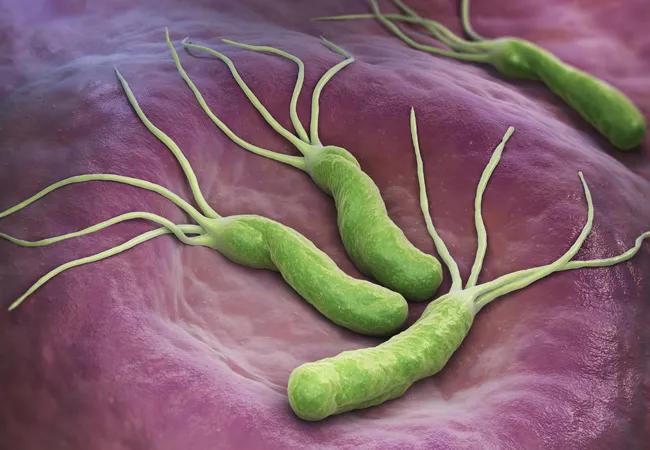Research finds low rates of positive test results

Patients with chronic upper gastrointestinal symptoms may undergo repeated endoscopies with biopsies to test for Helicobacter pylori infection, even if previous biopsies produced negative results. But does serial testing yield a more accurate diagnosis? A new study by Cleveland Clinic researchers suggests the benefits may not outweigh the risks.
Advertisement
Cleveland Clinic is a non-profit academic medical center. Advertising on our site helps support our mission. We do not endorse non-Cleveland Clinic products or services. Policy
“There’s much known about looking for H. pylori endoscopically and what to do with identified positive results,” says Cleveland Clinic gastroenterologist Benjamin Click, MD, a coauthor of the study presented at the American College of Gastroenterology’s 2021 annual scientific meeting. “There’s much less known about individuals who have negative results.”
Dr. Click has long wondered about the usefulness of serial testing, and decided to undertake the retrospective study after discussing the question with a colleague who had the same interest.
H. pylori infection is common globally and is associated with a wide variety of clinical symptoms and presentations, including nausea, abdominal pain, bloating and unintended weight loss. It also is a leading cause of gastric cancer.
For the study, the researchers reviewed the outcomes of more than 85,000 Cleveland Clinic patients who underwent esophagogastroduodenoscopy (EGD) with gastric biopsy between 2009 and 2019.
Of the 70,537 patients whose initial biopsies were negative for H. pylori, 10,280 (14.6%) eventually underwent the procedure again. Three percent of those repeat biopsies yielded a positive result.
Among patients who had a negative noninvasive index H. pylori detection test (either a urea breath test or a stool antigen test) and subsequently underwent endoscopy with gastric biopsy, H. pylori positivity was 4% in the negative urea breath test cohort and 8% in the negative stool antigen test cohort.
“Our research shows that repeating an EGD with biopsies after a prior negative H. pylori result is relatively common, but the result of the repeat testing including both invasive and noninvasive methods is positive in less than 10% of cases,” says Joyce Loh, MD, an internal medicine resident at Cleveland Clinic and a coauthor of the study.
Advertisement
Dr. Click notes that endoscopy and gastric biopsy can increase the chance of bleeding and other risks, and that both the procedure itself and the pathology assessment can increase patient costs.
“This research speaks to the relatively low yield of repeat testing,” he says, “and that perhaps we need to identify predictors or factors associated with subsequent positivity, to better guide our clinical practice patterns and to help guide cost-effective evaluations in this very common gastrointestinal procedure.”
Limitations to the research include the fact that it was a single-center study, although patients were distributed geographically across Cleveland Clinic facilities in Ohio and Florida, Dr. Click says.
More research is needed to inform clinical practice, he says. Next, the researchers will investigate the factors associated with subsequent positivity, to determine which patients might benefit most from follow-up testing.
“It’s hypothesis-generating and very interesting data,” Dr. Click says. “But I think there’s still more to be learned.”
Advertisement
Advertisement

Benefits of neoadjuvant immunotherapy reflect emerging standard of care

Multidisciplinary framework ensures safe weight loss, prevents sarcopenia and enhances adherence

Study reveals key differences between antibiotics, but treatment decisions should still consider patient factors

Key points highlight the critical role of surveillance, as well as opportunities for further advancement in genetic counseling

Potentially cost-effective addition to standard GERD management in post-transplant patients

Findings could help clinicians make more informed decisions about medication recommendations

Insights from Dr. de Buck on his background, colorectal surgery and the future of IBD care

Retrospective analysis looks at data from more than 5000 patients across 40 years